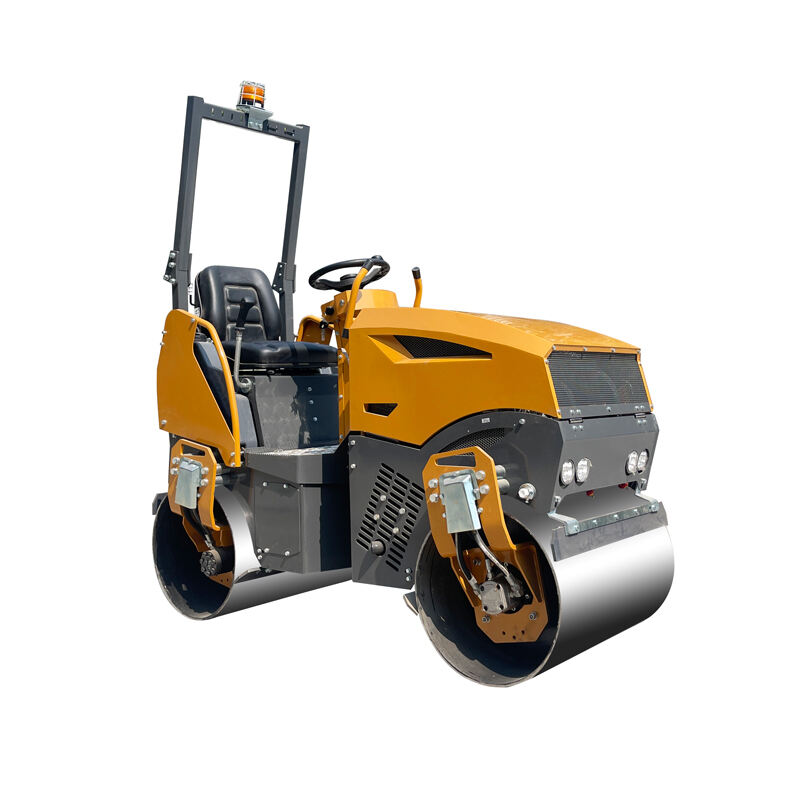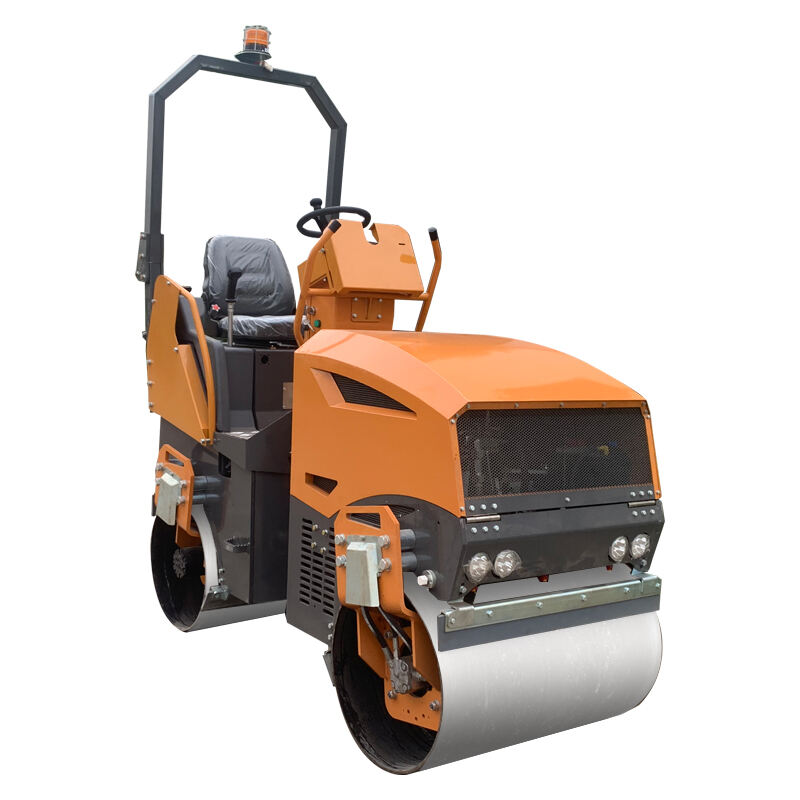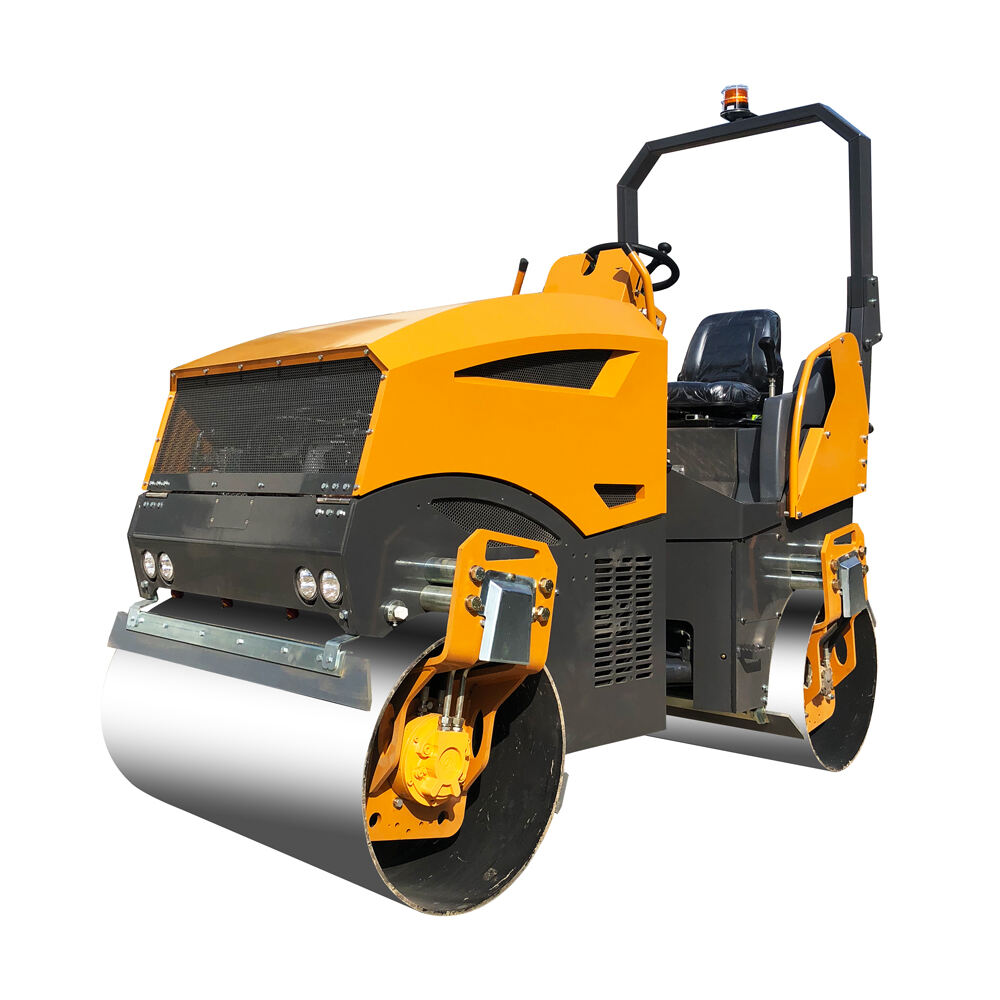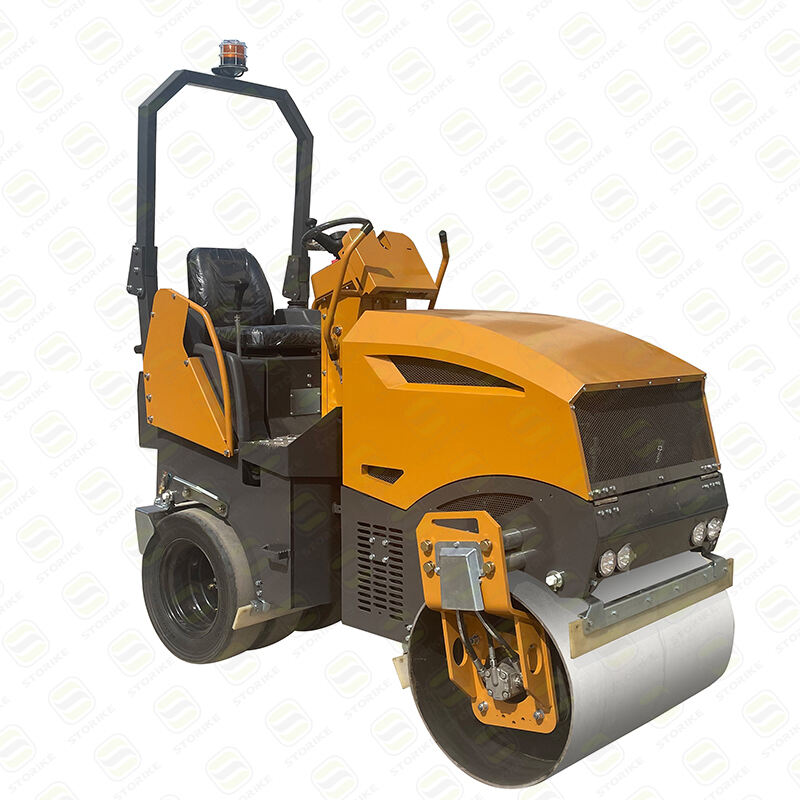Maintenance Tips for Roller Compactors
Essential Components of Roller Compactors
Engine Maintenance: Power Source Care
Keeping a roller compactor's engine in good shape means regular maintenance work cannot be skipped. Checking oil levels frequently and changing oil when needed keeps things running without problems most of the time. Stick to the oil types specified by the manufacturer for best results something most service manuals will tell anyone who reads them carefully. Operators should always listen closely while the machine runs because strange sounds often mean there's something wrong inside that needs fixing before it gets worse. When engines are properly maintained, road rollers perform better overall and break down less unexpectedly which helps keep construction projects on schedule instead of getting delayed.
Hydraulic System Checks: Pressure & Leaks
The hydraulic system plays a critical role in how roller compactors actually work, so regular inspections are really important if we want them running efficiently. When I'm out on site, I always take time to look at those hydraulic lines and connections closely. Even small leaks can cause big problems down the line, leading to poor performance or even damaged parts. Keeping an eye on fluid levels matters too because when they get too low, the whole system struggles to build proper pressure and just doesn't function right. We need to run pressure tests regularly with good quality gauges as part of our standard maintenance routine. This helps catch issues before they become major headaches. And remember to consult the manufacturer's guidelines for all these checks since different models might have specific requirements. Proper maintenance isn't just about following rules from a manual it's about keeping those heavy machines doing their job day after day without unexpected breakdowns.
Drum Care: Preventing Asphalt Buildup
The drum on a roller compactor plays a really important role in getting good compaction results, so it needs proper maintenance to avoid problems such as built up asphalt residue. Daily cleaning should be part of standard practice because leftover sticky stuff can seriously impact how well the machine works over time. For best results, I tend to go with specialized cleaning solutions designed specifically for the type of material we're working with these days. They get rid of stubborn debris without harming the drum surface itself. Checking the drum regularly for wear and tear is another must do task. A worn out drum just won't deliver consistent compaction quality anymore, which means the whole operation becomes less reliable and costs more money in the long run when repairs become necessary.
Routine Maintenance Checklist for Optimal Performance
Daily Pre-Operation Inspections
Starting every day with a thorough check before operating road rollers makes good sense for both safety and getting the job done right. Operators need to look at key parts first things first - tires, brakes, those visibility markers on top. Keeping records of these checks in some sort of maintenance journal helps track problems when they pop up later on, so fixes happen before something goes wrong. And let's not forget about those safety systems either. Emergency brakes must work properly, same with all warning lights. These aren't just nice to have items; they literally stop accidents from happening out there on the worksite where things move fast and mistakes cost lives.
Weekly Hydraulic Fluid & Filter Checks
Checking hydraulic fluids and replacing filters on a weekly basis stops machines from breaking down unexpectedly. When operators look at fluid levels regularly, they catch contamination early before it causes expensive damage to components. Most manufacturers recommend changing filters every 500 operating hours or so, whichever comes first. This simple maintenance step keeps systems running smoothly for years longer than they otherwise would. The money saved from avoiding emergency repairs and production stoppages adds up fast across multiple pieces of equipment in any industrial setting. Plants that stick to their maintenance schedules typically see return on investment within just a few months of consistent upkeep.
Monthly Lubrication Schedule for Vibratory Mechanisms
Road roller vibratory systems need regular oiling every month to keep them running smoothly and doing what they're supposed to do. Stick with the lubricants suggested by the maker because this means following proper maintenance guidelines and helps prevent parts from wearing out too fast. Keeping detailed records of when and how much oil was applied makes it easier to spot problems before they become major issues. We can see trends in wear over time and catch bad components early. This kind of careful record keeping not only extends how long the machines last but also cuts down on unexpected breakdowns during critical jobs.
Common Roller Compactor Issues & Troubleshooting
Uneven Compaction: Drum Alignment Solutions
Uneven compaction problems with roller compactors usually point to drum alignment issues that need attention. Checking alignment regularly helps keep things consistent across the worksite since misaligned drums just won't deliver even results. Most manufacturers provide specific guidelines about how to tweak drum positioning when needed. Sometimes these basic fixes work great, but when they fall short after several tries, calling in a pro makes sense for those stubborn alignment problems that refuse to go away.
Hydraulic System Failures: Leak Detection
Fluid leaks remain a persistent problem for hydraulic systems in road rollers, showing up either as puddles under the machine or simply reduced performance during operation. Many technicians now turn to colored hydraulic fluids because they make spotting leaks much easier in those complicated systems, especially around hard-to-reach areas. Getting these issues fixed quickly matters a lot since letting small leaks develop into major problems leads to expensive breakdowns and long periods without working equipment. When maintenance crews catch and fix leaks right away, it keeps the roller compactor running smoothly and reliably over time, which ultimately saves money on replacement parts and lost productivity.
Reduced Vibration Efficiency: Bearing Replacements
When bearings start wearing down, road rollers lose some of their ability to vibrate properly, which affects how well they compact materials. Checking these bearings regularly and replacing them when needed is really important for any preventive maintenance plan. Good bearing condition means better compaction outcomes because the machine actually works the way it was designed to. Most operators know from experience that neglecting this part of maintenance leads to all sorts of problems later on. The time spent on regular checks pays off by keeping machines running longer between breakdowns and saving money over time as equipment lasts longer before needing replacement.
STorike Roller Compactor Models for Reliable Compaction
ST1300 | 1.3-ton Vibratory Roller: Compact Efficiency
The ST1300 offers exceptional maneuverability combined with serious compacting power, which sets it apart from other vibratory rollers on the market today. What really stands out about this machine is how well it handles those tricky tight spots thanks to its small footprint and smart engineering features built right into the design. Many contractors have noted that despite its size, the ST1300 doesn't cut corners when it comes to delivering reliable results day after day, something that matters a lot in city environments where every inch counts. We've seen it work wonders on jobs where bigger equipment just wouldn't fit, proving that sometimes smaller machines can pack quite a punch when it comes to getting the job done right.
ST1800 | 1.8-ton Model: Enhanced Hydraulic Control
The ST1800 vibratory roller gets great marks for its better hydraulic system, which makes working with all sorts of loads much easier. The machine has some serious improvements when it comes to saving fuel, so it really beats older versions on the cost side over time. People who actually use these machines talk about how well they handle different kinds of ground, from soft dirt to rocky surfaces. That kind of versatility shows just how smartly designed this equipment really is. Contractors especially appreciate having something reliable that can keep going without constant adjustments, no matter what weird terrain throws at them during a job site.
ST2000 | 2-ton Roller: Dual Vibration Modes
What sets the ST2000 apart is its dual vibration system that gives workers real flexibility when tackling different kinds of compaction jobs. The machine can switch between modes depending on what material needs compacting, whether it's loose gravel or dense clay. Real world testing shows this equipment handles everything from road base layers to backfill work around foundations just fine. Operators appreciate the thoughtful design elements built into the machine too. Ergonomic controls reduce fatigue during those long days at the site, while safety features like emergency stop buttons are conveniently placed where they matter most. Many construction crews have made the switch to ST2000 because nobody wants their team struggling through uncomfortable gear when there's better options available now.
ST3000 | 3-ton Heavy-Duty Road Roller
Designed for tough jobs, the ST3000 vibratory roller has become a must-have piece of equipment for serious construction work and ongoing road maintenance tasks. What really sets this machine apart is its solid construction that can handle big projects without breaking down, which means fewer repairs and downtime over time. Contractors who've worked with the ST3000 often talk about how well it holds up under pressure, especially when dealing with rough terrain or tight deadlines. Many have used these rollers for months at a stretch on major highway projects where reliability matters most. For anyone looking to get more done without constantly fixing things, the ST3000 delivers consistent results day after day, helping crews stay productive even when conditions get challenging.
ST2000C | Combined Drum & Tire Design
The ST2000C has this cool setup that combines both drum and tire configurations, which gives it some serious edge when dealing with all sorts of rough ground conditions. The way it spreads weight across surfaces actually improves how tightly materials get compacted, so projects turn out better than with standard equipment. We've seen this machine shine particularly well on construction sites with mixed terrain or areas that have soft spots interspersed with harder ground. Operators who've used it report that while it works fast enough to keep schedules on track, it also adapts pretty well to unexpected obstacles in the field. That combination of speed and flexibility explains why so many contractors keep coming back for more after their first experience with the ST2000C.
 EN
EN
 AR
AR CS
CS DA
DA NL
NL FI
FI FR
FR DE
DE IT
IT NO
NO KO
KO PL
PL PT
PT RO
RO RU
RU ES
ES SV
SV TL
TL ID
ID LV
LV SR
SR SK
SK SL
SL VI
VI SQ
SQ ET
ET TH
TH TR
TR AF
AF MS
MS GA
GA HY
HY KA
KA BS
BS LA
LA MN
MN MY
MY KK
KK UZ
UZ KY
KY












